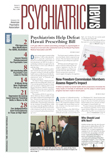Florida legislators recently defeated an effort to mandate “scare tactic” letters to parents of children that schools referred to health professionals for evaluation.
The bill (HB1213) would have required parents to read and sign a long and ominous-sounding statement detailing the dangers of the drugs if their public-school children are referred for evaluations of learning disabilities or emotional, behavioral, or mental disorders.
The Florida House of Representatives Health Care Regulation Committee rejected the bill by a vote of 6-4 on March 29. A similar measure passed the full legislature last year but was vetoed by Gov. Jeb Bush (R), who said it could lead to a “chilling effect on the evaluation and treatment of children with legitimate mental health needs,” according to media reports.
“This bill would have created barriers for children to gain access to evaluations,” said Wayne Goodman, M.D., professor and chair of the Department of Psychiatry at the University of Florida. “It wasn't really an informed consent. It was a scare tactic.”
Goodman, who earlier testified against the bill, likened the bill to a patient recommended for a mammogram having to first sign a waiver that highlights all of the dangers of chemotherapy and mastectomy procedures before they have taken a screening test.
The legislation, sponsored by state Rep. Gustavo Barreiro (R) and supported by the Scientology-funded Citizens Commission on Human Rights, includes descriptions of Food and Drug Administration (FDA) warnings that have been added to psychotropic medications. Actresses Kirstie Alley and Kelly Preston—both Scientologists—testified in support of the legislation.
Goodman, who is chair of the FDA's Psychopharmacology Advisory Panel that recommended black-box warnings on the labeling of antidepressants in children because of suicidality risk, said the bill's proponents used the FDA action to smear the use of all psychotropic medications for children.
“If the panel felt that antidepressants were ineffective in pediatric depression, we would have moved to have them banned or contraindicated for use in children instead of issuing a warning about side effects in a minority of patients,” Goodman wrote in a letter that urged the bill's defeat.“ On the contrary, we were of the opinion that an intervention with antidepressants can be life-saving by treating depression and preventing suicide in the majority of patients.”
The bill was strongly opposed by the Florida Psychiatric Society and other mental health organizations, including the state Office of Suicide Prevention.
The bill's impact could have been significant, since primary care physicians diagnose 19 percent of children they see as having emotional or behavioral problems, according to the President's New Freedom Commission on Mental Health. The Department of Education estimated in 2003 that 3 percent to 5 percent of the school-age population has ADHD. These children may be eligible for services required by the Americans With Disabilities Act.
The legislation's supporters will likely continue to push it, Goodman said. He noted that the Florida Senate has yet to act on the version of the bill (SB 2286) in that chamber.
Information on the legislation is posted at<www.myfloridahouse.gov/Sections/Bills/billsdetail.aspx?BillId=33370>.▪
